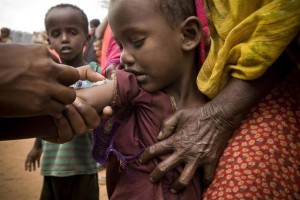Vaccination campaigns for children underway in the Horn of Africa “Critical lifeline” to protect malnourished children from killer diseases
2011-07-26
NAIROBI/ HONG KONG, 26 July 2011 – This week, UNICEF, the Kenya Ministry of Health and WHO have launched a vaccination campaign for children living in the host communities around Dadaab refugee camp in Northern Kenya. The campaign will target 202,665 children under five, with measles and polio vaccines, together with Vitamin A and de-worming tablets. It is part of a regional push to ensure all children in drought affected areas are vaccinated against a killer disease like measles which can be deadly for malnourished children, and be protected from polio.

Already last week, a vaccination campaign started in Southern Somalia, where vaccination coverage is just 26 per cent, one of the lowest in the world. Starting last Thursday and completed today, 40,000, children under five and 46,000 women, are being targeted in eight districts of Mogadishu including in overcrowded internally displaced camps. In Gedo region, preparations are on-going for the measles, , Vitamin A and de-worming and tentanus toxoid campaign planned in 6 districts targeting 55,000 children under five and 72,580 women of child-bearing age. Provided access is ensured, UNICEF, in partnership with WHO, hopes to expand the campaign in the regions of Galgaduud, greater Benadir, Bay, Bakool, Hiran, Lower Shabelle and the Jubas in the coming month. The plan is to expand coverage of measles for all children up to 15 years of age to reach a total of 2.5 million children.
In Southern and Central Somalia, cases of measles have been confirmed in Mogadishu, as well as cases of acute watery diarrhea in Mogadishu, Afgoye, Baidoa, Lower Shabelle regions. With so many women and children on the move, both crossing borders and becoming internally displaced, the challenge is to reach all children, including the older children, to prevent new outeaks of disease. In many parts of the worst affected areas, partners on the ground are already stretched trying to cope with the large numbers of people they need to help with these types of services.
“This is a child survival crisis,” said Elhadj As Sy, UNICEF Regional Director for Eastern and Southern Africa. “Children don’t die just because they don’t have enough food. In various stages of malnutrition, they are more prone to sickness and disease. As big a challenge as the rates of malnutrition pose, the danger for children extends even further.”
The campaign in northern Kenya, which starts today, will continue until Friday and target children in Garissa, Fafi, Lagdera and Wajir South. The plan is to extend it to refugees in the Dadaab camps in early August. UNICEF has procured measles and polio vaccines to support the campaign together with vitamin and de-worming tablets. UNICEF is also supporting social and community mobilization to ensure people know about the campaign and understand why vaccination is important.

Measles, a highly contagious disease, poses a serious threat as it can spread rapidly in overcrowded and unsanitary conditions, wiping out those that are weak from malnutrition. Measles reduces a child’s resistance to illness and makes them more likely to die when they are malnourished and suffering from other diseases. Vitamin A is given in emergencies to increase the likelihood of surviving the health risks associated with poor living conditions. A child who is vitamin A deficient faces a 25 per cent higher risk of dying from measles, malaria or diarrhea.
UNICEF estimates it will need HK$2.34 billion (US$300 million) over the next 6 months for a massive scale up of operations to reach children in the Horn of Africa’s drought affected areas with emergency and preventative assistance. The focus is on providing integrated interventions that addresses various aspects of a child’s survival and development including providing health services and vaccination.









